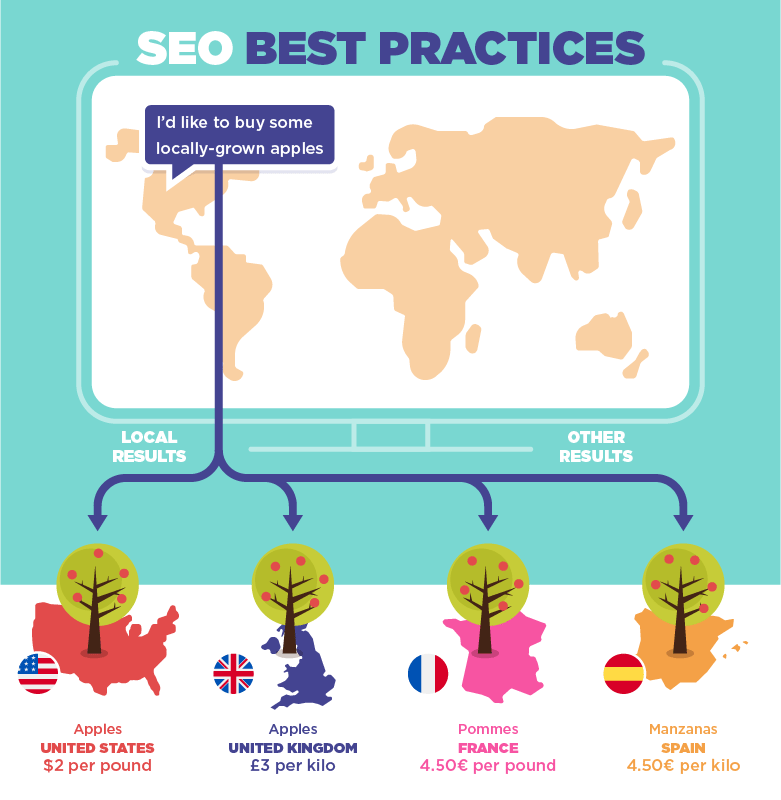From Localization to Globalization: International SEO Essentials
From Localization to Globalization: International SEO Essentials
Blog Article
Browsing the Digital Landscape: Leveraging International SEO for Cross-Border Success
In today's interconnected digital globe, services are significantly looking beyond boundaries to take advantage of worldwide markets. Leveraging search engine optimization (SEO) methods tailored for global target markets is important for attaining cross-border success. The intricacy of browsing the electronic landscape on a worldwide range demands a nuanced approach, from recognizing the principles of International search engine optimization to executing geotargeting and multilingual key words methods. As firms aim to increase their reach and exposure throughout different regions, maximizing site frameworks and checking cross-border efficiency come to be essential parts of a successful international search engine optimization technique.
Comprehending International Search Engine Optimization Fundamentals
Browsing the ins and outs of global SEO calls for a solid grasp of essential concepts to effectively expand on-line visibility across boundaries. One essential facet of worldwide SEO is comprehending the importance of localization. This includes customizing website material to suit the etymological, cultural, and industrial differences of target markets. Keyword phrases need to be not just converted however additionally adjusted to mirror exactly how customers in different areas look for details.
Additionally, having a clear understanding of geo-targeting is essential. This entails indicating to online search engine the particular countries or regions an internet site is targeting. Implementing hreflang tags is one way to communicate this info, ensuring that the appropriate variation of a webpage appears in the search engine result for an individual in a specific place.
Additionally, comprehending the impact of regional online search engine and social media sites platforms is vital for international search engine optimization success. As an example, while Google is dominant in numerous regions, countries like China have their very own online search engine like Baidu, needing tailored strategies for each and every platform to take full advantage of on-line exposure.

Targeting Multilingual Keyword Methods
Creating multilingual key phrase approaches is crucial for successfully getting to diverse global target markets and optimizing online presence throughout various linguistic areas. When targeting multilingual keyword approaches, it is important to conduct detailed research study to recognize the particular search terms and phrases utilized by the target market in each linguistic area. This involves not just equating keyword phrases but additionally taking into consideration cultural subtleties, regional dialects, and search trends distinct per target audience.
To produce an effective multilingual keyword method, it is important to focus on significance and search intent. Key phrases ought to align with the material on the internet site and reverberate with the social context of the target market. Making use of tools such as Google Keyword Phrase Coordinator, SEMrush, or Ahrefs can help determine high-performing key words in various languages and analyze their search volume and competition level.
Moreover, tracking and examining the performance of multilingual search phrases her comment is here on a regular basis is essential for maximizing and fine-tuning the technique in time. By continuously adapting to adjustments in search habits and trends, companies can boost their online presence and attract more worldwide web traffic to their sites.
Implementing Geotargeting and Hreflang Tags
When intending to boost global SEO approaches, including geotargeting and hreflang tags is critical for maximizing internet site visibility across various areas. Geotargeting entails customizing web content to specific areas, ensuring that customers in different areas receive pertinent info. By applying geotargeting, organizations can enhance their regional search positions and draw in region-specific traffic.

Optimizing Site Structure for Worldwide Presence
To better improve global SEO approaches past geotargeting and hreflang tags, maximizing the web site framework is important for achieving worldwide exposure and optimizing reach across different regions. A well-structured web site not only enhances user experience but additionally promotes search engine spiders in comprehending the content and context of the site.
Additionally, creating language-specific subdirectories or subdomains can assist online search engine deliver the ideal variation of the web site to customers based on their language choices, better boosting the general user experience. Furthermore, enhancing link frameworks to include appropriate key words and geotargeted terms can boost the site's visibility in various regions. By structuring the site efficiently for international audiences, organizations can boost their opportunities of bring in international website traffic and broadening their reach across borders.

Tracking and Examining Cross-Border Performance
Efficient tracking and studying of cross-border performance is vital for assessing the success of international search engine optimization techniques and identifying chances for improvement in worldwide reach and visibility. By carefully tracking essential efficiency indicators (KPIs) throughout various markets, organizations can obtain beneficial understandings into the efficiency of their cross-border SEO efforts. Checking metrics such as natural website traffic, keyword positions, conversion prices, and bounce rates can provide redirected here a detailed view of exactly how well an internet site is executing in numerous regions.
Evaluating cross-border efficiency information allows organizations to determine fads, patterns, and areas for optimization. By comparing performance throughout various nations, regions, or languages, firms can determine effective methods and localize content to much better satisfy details target market. Furthermore, monitoring cross-border efficiency allows services to stay active and receptive in the ever-evolving electronic landscape. Regular analysis of SEO efficiency on a global scale makes certain that companies can adjust their strategies rapidly to utilize on arising possibilities and preserve an one-upmanship in international markets.
Verdict
Finally, international SEO plays a crucial role in achieving cross-border success by enhancing sites for global visibility, targeting multilingual keyword phrase techniques, executing geotargeting and hreflang tags, and monitoring cross-border efficiency. By recognizing the principles of global search engine optimization and maximizing web site structures accordingly, organizations can efficiently reach and engage with their target audiences throughout different regions and languages. This strategic approach is essential for increasing market reach and driving online growth in today's electronic landscape.
Report this page